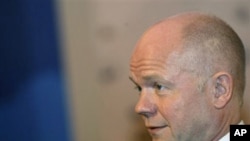Britain is sending a group of military officers to Libya. Foreign Secretary William Hague said the officers will be advising rebel forces, but won’t be training or arming them.
Hague said the British military officers will be heading to the opposition stronghold Benghazi, where they will be joining a diplomatic team already based there.
Richard Dalton is a former British ambassador to Libya. He said the move marks a further step in Britain’s involvement in Libya’s conflict - a step that he said is necessary.
"They will be assisting with communications and they will be assisting with organizational aspects," said Dalton. "They won't be undertaking training in fighting. But clearly, if a force is to stay in the field organized by the opposition to confront the attacks coming from the Tripoli government, then it does need to be properly organized and it does need to have proper communications. So I suspect this will be very valuable work."
|
In an interview with VOA's Susan Yackee, William Zartman, professor emeritus with Johns Hopkins School of Advanced International Studies, assesses the international coalitions' operation in Libya:
|
The U.N. Security Council passed a resolution in March that authorized a no-fly zone over Libya to protect civilians from Libyan government air attacks. That resolution did not sanction ground troops or a foreign occupation.
Hague said the decision to send officers to Libya does not conflict with the U.N. resolution.
Dalton said Britain will not be able to get further enmeshed in Libya without a new U.N. resolution. "We have been staging attacks on Libyan military infrastructure, as well as on specific positions and weapons systems of the Libyan government. Now it's possible, further down the line, that the coalition might go to the U.N. Security Council to seek additional authority. But at the present I do not see any prospect of that."
Russia on Tuesday said some Western powers have already violated the U.N. resolution. Foreign Minister Sergei Lavrov said the resolution was never designed to topple Libyan leader Moammar Gadhafi and some countries are pursuing that aim without the mandate to do so.
Gadhafi's forces shelled opposition-held Misrata again Tuesday. The city in northwestern Libya has suffered repeated attacks by government forces during the past six weeks. Aid groups say hundreds of people have died.
Dalton said it has been clear for weeks that resolving the Libyan conflict wouldn’t be easy. "Given that it's now clear that there is a military stalemate, the opposition in Benghazi is asking for additional support and the countries to which they address those requests have to decide how to respond."
Britain’s Foreign Office said the number of British military personnel in Benghazi will remain fewer than 20 after the additional officers arrive.




